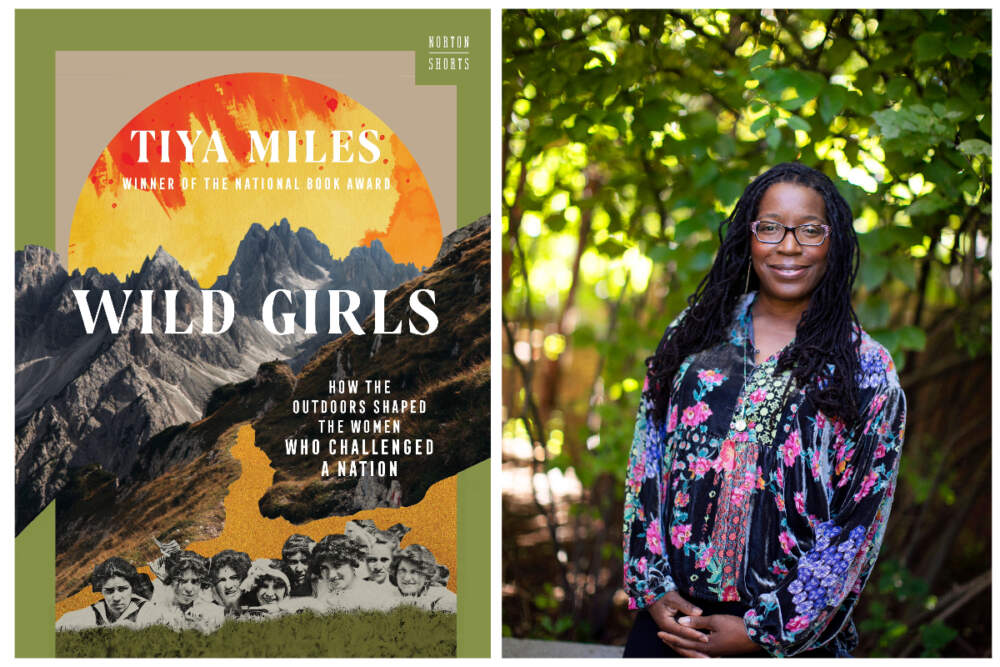Advertisement
Tiya Miles' new book 'Wild Girls' explores how the outdoors shaped the legacies of great women
As a young girl growing up in Cincinnati, Tiya Miles experienced the positive impact that being outdoors can have on a child. In a grassy meadow just beyond the edge of her neighborhood, she had a memorable encounter with some frolicking rabbits who “formed a kind of a circle and seemed to move in unison,” as if they were dancing. It felt to her as if she were being let in on some arcane secret. “In that instant,” she writes, “I knew wonder was possible… I learned that the unexpected, the impossible, and even the magical could occur outside.”
Miles, a professor of history at Harvard University and the author of the National Book Award-winning “All That She Carried,” which followed an heirloom cotton sack as it was passed down through three generations of Black women in the mid-nineteenth century, has carried the lesson of that magic childhood moment into adulthood.

In her latest book, “Wild Girls: How The Outdoors Shaped The Women Who Challenged A Nation,” Miles draws upon her experience as a historian and her passion for the outdoors to offer readers an engrossing series of essays detailing the profound influence that time spent in the wilderness had on some of America’s most notable nineteenth-century women, including Harriet Tubman, Louisa May Alcott and Laura Smith Haviland.
“I didn’t know at first that the book was going to be about the ways in which girls who ended up being very influential in American culture experienced a honing of their characters outdoors,” says Miles. But Miles’ argument is significantly informed by her past research, including her study of African-American history. “I’ve been interested in how enslaved people managed to survive the atrocity of slavery for a long time,” says Miles. “The relationship to the natural world, while complex and vexed, was a big part of this.” The story of Harriet Tubman in particular, for whom Miles says the outdoors was both “tormentor and teacher,” helped to clarify the path the book would follow.
“Wild Girls” was also inspired by Miles’ efforts to expand access to wilderness spaces for girls living in urban communities. In 2011, following an eye-opening environmental justice tour of Detroit, Miles founded ECO Girls, an organization that worked primarily with elementary and middle school girls from cities in southeastern Michigan. “I developed ECO Girls as a way to teach girls in our area about the place that they lived,” says Miles. “To try to introduce them to the wondrous aspects of that place and foster a sense of belonging and stewardship in the hopes that, as they grew, they could feel like they could be defenders and protectors of it.”
At the heart of “Wild Girls” is a stark dichotomy. On one side, there are the confining, constraining spaces that stifled the creativity, personal development and freedom of 19th-century women and girls — the Victorian domestic sphere, the Southern plantation house, the boarding schools founded to educate and “civilize” young Native Americans. On the other is the wilderness, a vast, unstructured space that inspired free thinking and helped the book’s subjects build the confidence necessary to challenge authority and effect change in American society.
“Girls who managed to reverse this condition of domestic confinement and get outside — to move, play, journey, explore, escape, and push themselves physically and mentally — were able to expand their minds, test their grit, develop their skills, and profoundly alter the course of their lives,” writes Miles. They became outsiders in the truest sense, and this helped them see the world in a new way. “It gave them the perspective of distance.”
In those confining spaces, women’s behavior was fiercely policed, sometimes by the very structure of the built environment itself. For Miles, the outdoors presents an opportunity for women and girls to exist in an unbound space in which, for a time, they do not need to be so conscious of their gender and its implications. “Outdoor play can shape kids,” says Miles. “Our interior spaces are often quite gendered. Once you’re in a space that’s not telling you what you should and shouldn’t like, you might realize new preferences.” And once you’re in a space that’s not telling you what you can and cannot do, you may learn to question the arbitrary nature of the rules that govern your behavior.
She cites Louisa May Alcott as someone who was able to see through the absurdity of restrictive Victorian social mores thanks to the lessons she learned by sneaking away to climb trees and wander around Walden Pond. In those journeys, she managed to find a way of escaping contemporary expectations of feminine modesty and self-control. As Laurel Thatcher Ulrich famously wrote, well-behaved women seldom make history.
Miles hopes that, as a culture, we are more willing to give children a long leash when it comes to exploring their environment. She imagines a world where every child has a chance to find themselves outside. “Being independent outdoors with kids your own age makes for the best learning experiences,” she says. “We should fight to open access to these spaces for anyone who doesn’t have access to them.”
“For me, this project was a joy,” says Miles. “Even though so much of what I write about is the struggle these girls faced, I felt so inspired revisiting their childhoods, seeing how they embraced their surroundings and, when their surroundings were a threat, stood up for other people.”
Tiya Miles will discuss her new book on Sept. 21 at the American Ancestors/New England Historic Genealogical Society and on Oct. 3 as part of "Beyond the Page."
